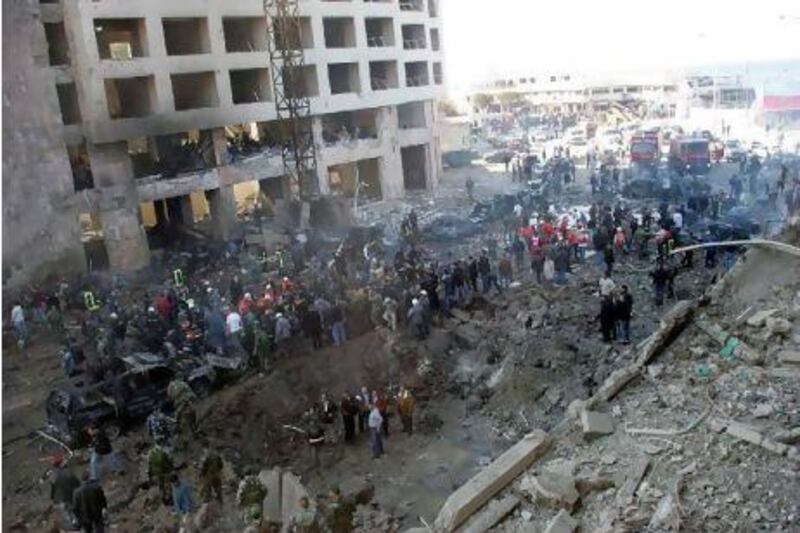BEIRUT // Six years on, passersby can still see the destruction wrought by the denotation of two and a half tonnes of explosives that blasted through a Beirut street in 2005, killing the prime minister, Rafiq Hariri.
Areas around the site of the bombing remain eerily unchanged. Buildings on either side of Minet el Hosn Street have not yet been repaired and still bear the scars of the blast.
More than six years after the suicide bombing, the impact of the attack lingers on Lebanon's political environment, its security and the continuing investigation by the United Nations-backed Special Tribunal for Lebanon (STL) into the murder of the former Lebanese prime minister and 21 others.
The blast also injured 231 people, according to the STL indictment that was made public last month.
Scores more were affected by the loss of relatives.
The STL launched a process through which people who suffered mental, physical or material harm from the attack can request to participate in the court proceedings.
Last week, the tribunal announced a deadline of October 31 to file applications for victim status. No trial date has been set, nor have the four accused men - named in the indictment as "supporters of Hizbollah" - been apprehended.
However, those who are accepted and regisered as victims will be able to take part in proceedings when the trial eventually begins.
They will be represented by a lawyer and afforded some of the same rights as the defence and prosecution - able to call and cross-examine witnesses, submit evidence and file motions.
Alain Grellet, chief of the STL victims' participation unit, stressed the important role that victims will play in the proceedings.
"It is important because justice cannot be done if you cannot hear the victims and if they don't have a place in the trial," he said. "What we have been saying is, 'Don't be a victim twice'."
It is not clear how many of the potential victims will eventually participate in the proceedings.
Mr Grellet said his unit had registered "quite important interest", so far receiving a few dozen applications for victims' status.
Mohammed Mattar, a lawyer for several families who lost relatives in the bombing, including the late prime minister's son, Saad Hariri, said most of those he represents have applied to take part in the trial. "These people, their loved ones, their sons or daughters or fathers have been killed in an act of terror," he said. "They basically want justice and to mete out punishment.
"The assassination of Rafiq Hariri came within a chain of assassinations that gripped Lebanon for a long period of time and the perpetrators always went with impunity.
"The Lebanese victims of the assassination and the Lebanese at large have a huge vested interest in the STL and its proceedings."
But this view is not shared by everyone in Lebanon. Hizbollah has branded the tribunal politicised, insisting it will not hand over the four accused men.
Members of the opposition March 14 coalition, led by the Future Movement that Mr Hariri founded, support participation with the court.
The Lebanese government has neither explicitly pledged outright support for the tribunal, nor criticised the process.
Mr Mattar and others have acknowledged that some victims may be fearful of taking part given the divisive nature of the investigation in Lebanon.
Some, such as Khalil Abdul Sattar, 73, say they just want to move on.
He suffered minor injuries and significant damage to his shop on Minet el Hosn Street but he does not intend to participate in the trial.
He believes the STL investigation "is more about a fight among parties both in Lebanon and outside".
"I don't want to get involved in this fight," he added. "I don't have faith in anybody, in any party here or abroad."
Mr Abdul Sattar can still remember the explosion. He was standing in his souvenir and jewellery shop about 100 metres from the blast when he was suddenly thrown backwards, as glass from shattered display cabinets rained down on him.
"The sound was like something completely different. I though it was an earthquake," he said.
The shop, which his family has run since 1952, was badly damaged.
In the months after the attack, Mr Abdul Sattar was given financial support through the Lebanese army - a few thousands dollars, he said. But the actual losses were much more.
Individuals recognised by the STL as victims may eventually be able to seek damages through the Lebanese court system, if the accused are convicted. Omar Nashabe, a specialist in criminal justice and head of Al Akhbar newspaper's research unit, said that despite reservations about the tribunal, the participation of victims could have a positive longer-term impact on the Lebanese judicial system.
"I hope [victims] will come forward - if the tribunal will function according to the highest standards of international criminal justice," he said. "The idea of having victims of the crime participating gives the legal proceedings more credibility.
"Justice is for the public, but it is also for the people who suffered directly from the crimes perpetrated."





